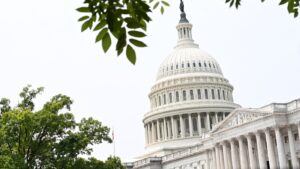Senate Faces Challenges in Passing President Trump’s Budget Bill
The U.S. Senate is currently deliberating on President Trump’s expansive budget proposal, which recently cleared the House by a narrow margin. As the bill makes its way through the Senate, its fate depends heavily on whether Republican senators can maintain unity.
Several GOP senators have expressed reservations, citing concerns over the bill’s high costs and potential reductions to Medicare, which could adversely affect Americans. Senator Jeff Merkley, a Democrat from Oregon, shared his apprehensions with NPR’s Steve Inskeep on Morning Edition, pointing out that some Republicans are uneasy with the bill’s provisions. He also highlighted the likelihood of amendments due to Senate rules on budget reconciliation, a procedure Republicans are utilizing to advance the bill.
Interview Highlights
Steve Inskeep: Can Democrats influence any aspects of the bill they disagree with?
Jeff Merkley: There are opportunities for adjustments, as the Senate’s rules restrict several provisions included in the House bill. Many senators, including Republicans, are concerned about the negative impact on American families.
Inskeep: Can you elaborate on those concerns?
Merkley: The bill could result in millions of children going hungry and 14 million Americans losing health care, all to fund tax breaks for billionaires. This contradicts President Trump’s campaign promises.
Inskeep: Republicans argue they aim to make Medicaid more efficient without affecting coverage. Where does your figure of 14 million losing coverage come from?
Merkley: That’s based on estimates from the Congressional Budget Office, an impartial entity created to provide accurate projections.
Note: A preliminary CBO report predicts that approximately 13.7 million people might lose health insurance by 2034 due to changes in Medicaid and other factors.
Inskeep: The reconciliation process is supposed to focus on financial aspects. Yet, the bill includes measures like limiting judicial powers. Is this provision likely to remain?
Merkley: We expect it to be removed. The Byrd Rule, named after Senator Robert Byrd, stipulates that measures primarily about policy rather than budget cannot be included. We’ll challenge it, and we believe the parliamentarians will agree, unless Republicans resort to the nuclear option to bypass the process.
Inskeep: There is also a clause preventing states from regulating AI for ten years. Will this stay?
Merkley: It’s also likely to be removed. When Democrats used reconciliation, we faced similar challenges, such as the removal of a provision to cap insulin costs due to Republican objections.
Inskeep: Even with spending cuts, tax breaks in the bill could increase the federal deficit. Do Democrats have alternatives to lower the deficit?
Merkley: Certainly. We can eliminate tax breaks for the wealthiest, saving significant amounts. The current bill disproportionately benefits the top 10% with around $90,000 annually, while the bottom 20% receive only $90.
Inskeep: President Trump previously supported tax increases for the wealthy, yet this bill contains none. Is that accurate?
Merkley: Yes, that’s correct.
This digital story was edited by Obed Manuel. The radio version was edited by Ally Schweitzer and produced by Nia Dumas.







Be First to Comment